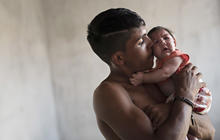As Zika threat looms, how pregnant women can protect themselves
The first-known baby born in the mainland United States with Zika-related birth defects faces a "very poor" prognosis, health officials say.
According to doctors at Hackensack University Medical Center in New Jersey, an ultrasound revealed the baby was born with a smaller head and underdeveloped brain -- a condition known as microcephaly. The baby's mother contracted the Zika virus in Honduras.
Now, as the U.S. enters summer and mosquito season, experts are urging pregnant women to educate themselves about Zika and take the appropriate steps to protect themselves and their unborn children from the virus.
First, it's important to know that not every woman who contracts Zika while pregnant will have a baby with microcephaly. Current estimates are that between 1 and 13 percent of infants born to mothers who were infected in the first trimester may have the birth defect.
However, many questions still remain about the virus's long-term effects, even on children who don't have obvious birth defects.
"One thing we still don't understand is, for the children who don't have small heads, are they going to have abnormalities? And that's something that we may not know for months or years," Dr. Tom Frieden, the director of the Centers for Disease Control and Prevention, told "CBS This Morning."
That's why it's so important for pregnant women to take precautions to protect themselves and their unborn babies.
The CDC recommends women who are pregnant to avoid travel to areas where Zika is active, including much of Latin America and the Caribbean.
"And if you're pregnant and you're in a place where Zika is spreading, do everything you can to protect yourself from mosquito bites," Frieden said. Use insect repellent, wear long sleeves and long pants, and stay inside with air conditioning and window screens as much as possible, experts recommend.
The virus can be transmitted through sex, so "if you're a man and your partner is pregnant and you've gone to a place where Zika is spreading, use a condom until the pregnancy is over," Frieden said.
For those thinking about becoming pregnant, theguidelines get a bit more complicated.
"If you're thinking about becoming pregnant then we recommend that you wait two months if you haven't been sick, and six months if you have been sick," Frieden said.
When asked how prepared American hospitals are to handle cases of Zika, Frieden affirmed that many are ready, but that pregnant women who are infected should to seek specialty care.
"High-risk obstetrics is a very important skill and science," he said. "That's why we encourage women who've been in places where Zika is spreading to get tested so that if they do have a child who might be infected they can go to somewhere that's prepared to deal with what might be a very complex delivery and neonatal period."
Currently, 38 pregnant women in Florida are being monitored for Zika. Governor Rick Scott yesterday said his state faces "disaster" without immediate federal funding to battle the mosquitoes that carry the virus.
For Frieden, he said he hopes government leaders will act sooner rather than later.
"It's very important that we move forward rapidly," he said. "Congress did the right thing with Ebola and I hope they will do the right thing with Zika and the sooner the better. We need to start the long-term projects to better support pregnant women, come up with better ways to diagnose the infection, come up with better ways to control the mosquito. All of that requires congressional action."


No comments:
Post a Comment